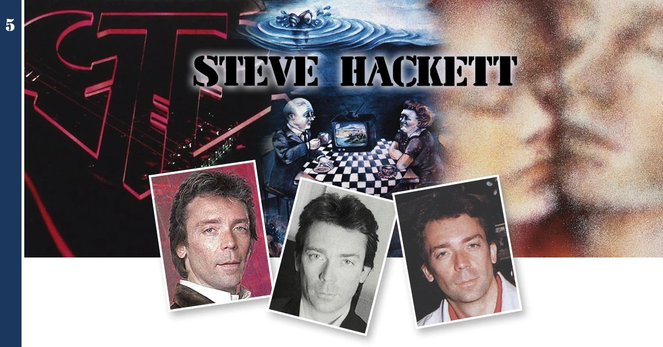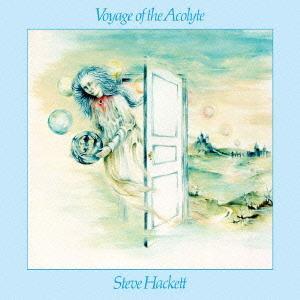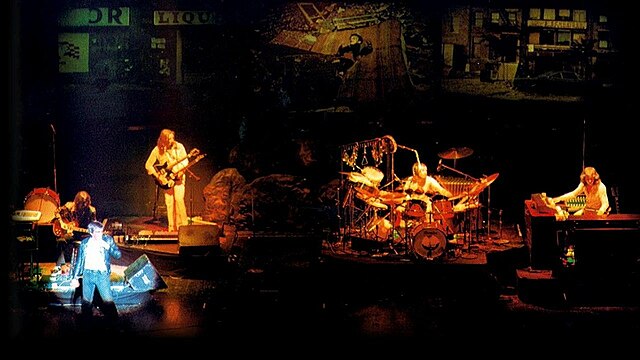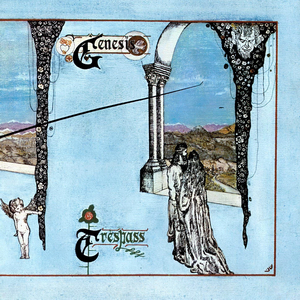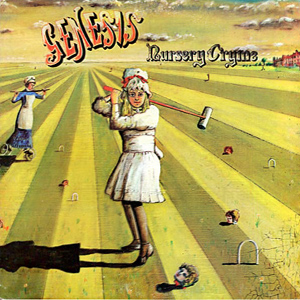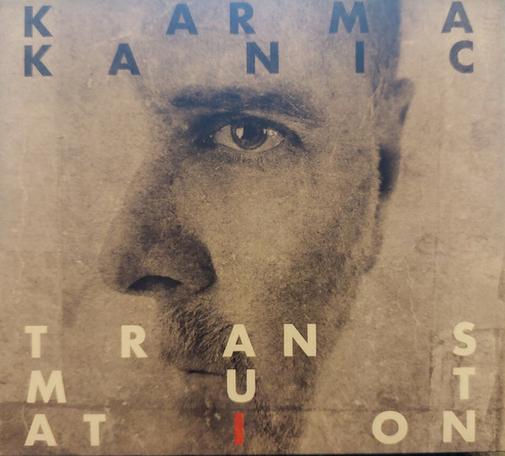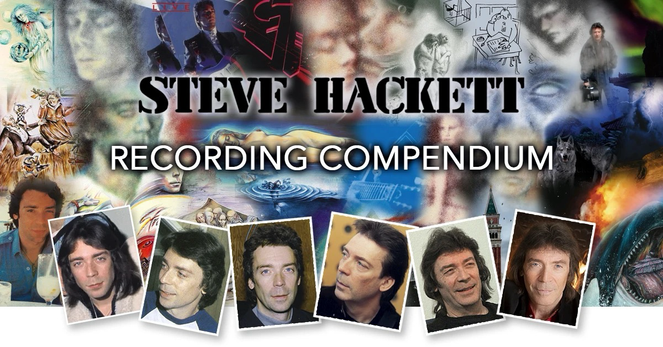Teil 5 unseres STEVE HACKETT Recording Compendiums (1984-1989) ist nun online: https://t.ly/Kf-Ni
#stevehackett
#stevehackett
STEVE HACKETT wird auch diesen Sommer wieder Shows mit DJABE in Ungarn sielen. Details:
https://t.ly/kiBoa
#stevehackett #djabe
STEVE HACKETT wird im Juli 2026 im Rahmen einer einwöchigen "Trading Boundaries Voyage" Rhein-Kreuzfahrt mit seinem Acoustic Trio auftreten. Details: https://t.ly/K-mms
#stevehackett #rhein
wow. #stevehackett nailed it.
*** NEWS *** - Steve Hackett feiert GENESIS-Meisterwerk mit Live-Aufnahme
https://www.hooked-on-music.de/news/steve-hackett-feiert-genesis-meisterwerk-mit-live-aufnahme/2710
#news #genesis #stevehackett #raywilson #steverotheryband
STEVE HACKETT: "The Lamb Stands Up Live At The Royal Albert Hall" erscheint als 2CD/Blu-ray sowie 4LP-Set am 11. Juli 2025. Details: https://t.ly/uDQL5
#stevehackett #genesis
Konzerthaus, Congresshalle, Metropol Theater, Lichthaus: Alles schön und gut, aber "Uber Eats Music Hall"!?
Ultimo album dei #Karmakanic appena uscito dal titolo #Transmutation
Il brano che qui vi propongo si chiama #cosmiclove e come si vede c'è la guest collab del vulcanico #JohnMichell
(ma nell'album ci sono molte altre stelle del prog tra cui #stevehackett e #nickdvirgilio)
https://www.youtube.com/watch?v=_Az35yv7pFM
#progressive #progrock #progressiverock #rockprogressivo #altrock #fediradio
Seems appropriate with the big guy passing away recently.
@boomtownpodcast Two of my guitar heroes! Good concept for band but it wasn't great. I remember seeing them play in Kingston, NY around 1994 or so.
20 Great Songs by Genesis
Genesis in their “classic lineup” incarnation on the Lamb tour, 1974-75, clockwise from left: Peter Gabriel, Steve Hackett, Mike Rutherford, Phil Collins, and Tony Banks. image: Nick Contador.***
Some bands are made for their era, while others are equipped for change. Some rarified musical outfits are both. That’s where British prog pioneers and hit-making radio singles band Genesis fits best.
From the earliest folky-prog days of their first few albums, to the deceptively complex yet radio-friendly pop rock they’d make in the Eighties and into the Nineties, Genesis was still Genesis. Each era lives on its own and also as a part of a varied tapestry of styles and approaches over the course of decades. Here are 20 great songs by Genesis to illustrate the point.
***
The Knife
With founding member and guitarist Anthony Phillips still in the lineup for 1970’s Trespass, Genesis demonstrated their wider musical ambitions past the lighter sound of their debut the year before. Their penchant for pastoral folk-rock is in place along with their nascent impulses to stretch out into more complicated arrangements. “The Knife” is the album’s centerpiece that reveals their emerging sound and approach to the greatest effect. This includes much darker subject matter in the lyrics.
This is the story of a rise to power based on egotism, manipulation, fear, and false promises, inevitably ending in violence. Phillips’ distorted guitar lines, Tony Banks’ portentous Hammond organ, and Peter Gabriel’s soulful bark of a voice filtered through a bullhorn-like effect are highlights to support the song’s themes. Far away from prog-rock’s reputation for escapist lyrics, “The Knife” is rooted in contemporary political anxieties related to the violence of the state. The shock of the Kent State shootings in May 1970 that also inspired CSNY’s “Ohio” is very much present here as well.
Listen: The Knife
The Musical Box
By the time Genesis convened to record 1971’s Nursery Cryme, guitarist Phillips and drummer John Mayhew had left the band. Steve Hackett and Phil Collins replaced them, respectively. As these new members joined with Banks, Gabriel, and bassist Mike Rutherford, they established what is recognized as the classic Genesis lineup, enabling greater cohesion between the profusion of ideas submitted by each songwriter in the band. This helped them to hone their craft for the longer and more complex pieces they’d begun to explore previously.
“The Musical Box” is a sterling example of this progression. It reflects their interest in exploring the English identity through cultural tropes, settings, and myths, with repression, murder, and lust seething underneath it all. New guitarist Hackett shows a prodigious flair for balancing colourful sonic filigrees, strong melodic lines, and sheer muscle. And besides Phil Collins’ superb, melodically sympatico drumming here, the song also showcases how his backing vocal perfectly matches Peter Gabriel’s lead in every respect, nicely setting events up for later in the band’s career.
Listen: The Musical Box
Return of the Giant Hogweed
Peter Gabriel’s common songwriting approach while in Genesis was adding elements of the absurd to daily news stories in his lyrics. “Return of the Giant Hogweed” from Nursery Cryme is one of the finest examples, infused with dry humour and an appreciation of the ridiculous. The narrative concerns the struggles to thwart the titular invasive plant (Heracleum mantegazzianum) plaguing Britain’s waterways. It’s positioned as a Day of the Triffids-style science fiction story, subtly lampooning prog rock’s reputation for the fantastical while it’s at it.
Collins and Rutherford keep things on track between Gabriel’s wordiness and Tony Banks’ instincts for extended instrumental passages. Steve Hackett distinguishes himself via his innovative “tapping” technique which he popularized for the hard rock and metal guitarists coming up behind him. Gabriel lays down one of his most idiosyncratic vocals to date as the frenzied narrator (“Strike by night! They are defenseless!”) and the “voice” of the song’s phototoxic antagonist. He performs this while delivering bona fide botanical knowledge about the giant hogweed, Latin terms and all.
Listen: Return of the Giant Hogweed
Supper’s Ready
“Supper’s Ready” from 1972’s Foxtrot album is the most ambitious piece of Genesis music conceived to date. It’s certainly the longest, clocking in at over twenty-three minutes. But that’s what you get when you want to write a romantic ballad that draws parallels to the battle between good and evil at the end of the world. Presented in seven sections and incorporating a flurry of disparate musical ideas and textures from the whole band, “Supper’s Ready” was a creative breakthrough, consolidating the band’s capacity for next-level composition as it relates to longform rock storytelling.
Peter Gabriel’s lyrics contain several Biblical references along with symbolic, mythical and even horrific imagery. The music expands on the band’s collective ability to put across the grandiose, grotesque, and absurdist themes in perfect musical symmetry. All the while, “Supper’s Ready” really is a love song, albeit an unconventional one. It entwines the realms of the romantic, the phantasmagorical, and the cosmic over an epic-length runtime, making “Supper’s Ready” beloved by fans across generations.
Listen: Supper’s Ready
Get ‘Em Out by Friday
Also featured on the Foxtrot record, “Get ‘Em Out by Friday” concerns a very real state of affairs at a time in Britain when ex-council estates in working class neighbourhoods were snapped up by private interests. Its costuming is decidedly of the Phillip K. Dick meets Jonathan Swift satirical science fiction variety, concluding with a final episode in which Genetic Control alters human DNA to make people smaller so as to pack more of them into less space. This is all in the interest of humanity, of course – and to make tidier profits.
This cut is one of the best showcases of Gabriel’s theatrical flair beyond the outlandish costumes he’d begun to use in their live shows by this time. He seamlessly embodies all of the characters, from the callous real estate owner John Pebble, to his minion The Winkler, to the beleaguered tenants forced to move from their homes. This song is more like a theatrical event than a pop song. Also, Mike Rutherford is the instrumental MVP for his exemplary bass playing on this cut.
Listen: Get ‘Em Out By Friday
Firth of Fifth
Tony Banks’ piano intro to this epic track from 1973’s Selling England by the Pound is one of the most recognized musical themes of the classic lineup era. The lyrics comment on humanity’s tendency to adhere to blinkered systems that seem so immutable to us, yet pale in comparison to nature’s grandeur. The lyrics and vocal melody are appropriately grand and hymn-like, their gravity perhaps undercut by its pun of a title derived from the name of a Scottish river estuary – Firth of Forth.
The song connects various instrumental sections between Gabriel’s voice and flute, to the synthesized thematic reprise, to Hackett’s sustain-soaked explorations on guitar. This latter element is among the guitarist’s best and most celebrated instrumental passages in the Genesis catalogue, included prominently in his own more recent Genesis Revisited shows. Collins’ drumming is a binding force, serving the complex tempo and time shifts while always in support of the melody. As a whole or in part, the song became a live staple across decades.
Listen: Firth of Fifth
The Cinema Show
Featured on Selling England by the Pound, “The Cinema Show” contains some of the same sentiments found in “Firth of Fifth”; the overwhelming presence of the natural world and our very small and temporary place in it. Starting with a conventional narrative of two lovers preparing for a date, the song connects their lives to the origins of the earth itself and the relentless passage of time that has defined it. Yet, this is no dour tune about our relative smallness in the universe.
Instead, it’s a celebratory ode to the grandest cinema show of all; of being alive in an expansive, mysterious world where love is still possible, even under the weight and scale of history. As testament to its joyful spirit as a part of the band’s own weighty history, facets of “The Cinema Show” appeared as fixtures of their live shows throughout their various incarnations and eras. Featuring joyous melodies and playing , this is the warmest, most life-affirming song of the classic Genesis era.
Listen: The Cinema Show
Twilight Alehouse
Featured as a B-side to their first hit radio single “I Know What I Like (In Your Wardrobe)”, Genesis developed “Twilight Alehouse” over the course of years from Anthony Phillips’ tenure onward, becoming a fixture in their early live shows. It reflects the band’s sound and approach by this time, with tempo changes, advanced instrumental precision, and textural variance. But it’s a unique song in their catalogue as a first-person character portrait of an estranged man whose only solace is the bottle.
Where many early Genesis songs deal in grand themes on an epic scale, this one is earthier, and reveals an emotional involvement without the whimsy, satire, dry humour, and mythological references for which they’d become known. Instead, there is genuine pathos for its central character, and with a straightforward narrative. In support, it also rocks like nobody’s business with a driving groove and quiet-loud dynamic to contrast the band’s keen attention to musical detail.
Listen: Twilight Alehouse
In the Cage
Genesis’ ambitions spiked again in 1974 as they set out to create a cinematic narrative across a whole album. The result was their two-disc concept record The Lamb Lies Down on Broadway about a New York street kid called Rael ensnared in a series of subterranean and/or subconscious adventures. The record is a grittier affair, dealing in much darker thematic territory than ever before toward the end of Peter Gabriel’s time with Genesis.
“In the Cage” is among the band’s most lyrically harrowing cuts. On it, Rael is trapped in agony in a cage of stalactites and stalagmites, desperate to find his brother John, a figure who is possibly only a facet of his own identity. The song offers some career-best singing from Gabriel who employs his full vocal range and knack for theatricality. It features a woozy rhythm of heartbeat-like pulses against the beat in 3/4 time, the Collins-Rutherford rhythm section adding to the song’s sense of menace and disorientation in support of Tony Banks’ exemplary keyboard work.
Listen: In the Cage
The Lamia
Peter Gabriel wanted to explore deeper themes on the Lamb including those of isolation, confinement, and guilt. This was possibly entwined with his personal struggles to balance his role as a family man with his demanding rock star schedule at the time. This episode in the story finds Rael in an underground pool, seduced by three serpent-like creatures; The Lamia. They all have sex and the creatures die. Rael consumes their remains, thereby corrupting himself in what becomes a turning point in the story.
“The Lamia” is lyrically shocking, juxtaposed with its gentle palette of delicate piano, lyrical twelve-string guitar, and warm synthesizer. These visceral lyrics set in stark contrast to Rael’s higher search for identity and freedom seemingly paralleled Gabriel’s own feeling while in the band by then. For him, the lights had dimmed and the stage was set for someone else. Luckily, it turned out all right for Peter Gabriel as he cut his own path to considerable solo success post-Genesis.
Listen: The Lamia
Squonk
Genesis held auditions for Gabriel’s replacement following the Lamb tour. An excellent singer in his own right, drummer and backing vocalist Phil Collins was a natural fit to direct prospective lead singers on material that would later appear on 1976’s A Trick of the Tail. “Squonk” was the litmus test. During these auditions, Phil laid down a version himself and emerged as the best candidate almost inadvertently. His connection to Gabriel’s lead voice as a backing singer and the ineffable common denominators heard within that blend likely sealed the deal.
“Squonk” was the heaviest Genesis track up until this point, with Rutherford’s earthshaking bass mixed with Collins’ John Bonham-like drums. This more muscular feel showed their continuing evolution as musicians and writers, and also as record-makers. As for their worries about how the audience would react to their new lead singer, it’s actually hard to imagine Gabriel’s voice in place of Collins’ here. To everyone’s delight, including Gabriel’s, the band found great success (and higher record sales) than ever before hereafter.
Listen: Squonk
Entangled
On this cut from A Trick of the Tail, a waltzing music box lilt from Steve Hackett’s dreamy 12-string guitar accompanies his lyrics in combination with Tony Banks’ compositional additions. The song concerns a session of hypnotherapy, possibly conducted by nefarious practitioners, with plenty of dry comedy to make this endearingly eccentric. This is one of the best examples of the band’s ability to create sympathetic music to match the subject matter; a hypnotic melody and rhythmic structure in a song that’s all about hypnotists.
The melancholic beauty in this song really does pull a listener in until we’re entangled by its winsomeness before the lyrical hammer comes down – you’ll have no trouble until/you catch your breath/and the nurse will present you the bill. The song’s duplicity between the way it sounds and what the lyrics tell of it adds to its charm. “Entangled” is among the greatest of the band’s ballads in this way, revealing that nothing is quite what it seems even with delicate textures and hushed singing.
Listen: Entangled
Blood on the Rooftops
A highlight on 1976’s Wind & Wuthering, “Blood on the Rooftops” is a gentle ballad that suggests generations of people left behind by culture, with only stultifying television media as their narrow window to a world that no longer makes sense to them. The song is a co-write between Hackett and Collins rooted in contemporary subject matter that’s all about alienation, isolation, and loneliness, keenly contrasted by the former’s highly romantic classical guitar textures at the outset.
This is another of Steve Hackett’s best contributions as a writer in Genesis, with his melancholy melody in the verses held in perfect balance to Collins’ anthemic chorus. By this time, Hackett wanted to stretch his compositional muscles while feeling like he had too many ideas for the band he was in. Leaving Genesis after 1977’s Seconds Out live album, Hackett continued his prolific, musically varied, and successful solo career he’d begun while still in Genesis. Decades later, he became a dedicated curator of the early-to-mid Genesis period in his own live shows.
Listen: Blood on the Rooftops
Turn it On Again
Post-Hackett, Rutherford stepped up to handle lead guitar, rhythm, and bass parts in the studio. With 1978’s tellingly-titled And Then There Were Three featuring breakthrough radio hit “Follow You, Follow Me”, the pop trio incarnation of the band was born. And just in time for a new decade, “Turn it On Again” successfully repositioned Genesis during a time when their prog-rock pioneer status was out of synch with the musical zeitgeist.
Featured on 1980’s Duke, this tune became a classic rock radio staple even in the age of new wave and dance pop. Not straying from prog entirely, the song adds an extra beat to the standard rock song chug, placing it in an unconventional 13/4 (or alternating 6/4 and 7/4) time. This made it a compelling song for dancing, but a challenge when attempting to do so. Collins lays down one of his career-best vocals in this character study about delusion and loneliness that sounded great coming out of car radios and onstage.
Listen: Turn it On Again
Evidence of Autumn
At a turning point in their stylistic trajectory, “Evidence of Autumn” reflected Genesis’ pastoral roots in tone if not instrumentation. The song appeared as a B-side in 1980 and as a studio track on the North American version of 1982’s Three Sides Live. Tony Banks’ sweeping piano anchors the whole as Mike Rutherford creates compelling bass flourishes underneath. Phil Collins’ vocal carries the lilting main melody in one of his most affecting vocal performances on record.
Rural and natural images appear again here as they did on “Firth of Fifth”. Here, the lyrics aren’t quite as cerebral in a song about idealized lost love. This is one of the band’s most emotionally charged songs, with a melody that beams with joy and aches with the pain of loss all at once. Its celebration of a memory and the mourning of it sounds like a final farewell to the past as Genesis began to turn a corner into a new musical milieu. This quality only adds to its wistful beauty.
Listen: Evidence of Autumn
Abacab
By 1981’s Abacab album, Genesis established their own studio space. This allowed them to explore ideas live off the floor with greater freedom and flexibility and to be more selective as to what went on the records. They wanted to shed what they believed to be Genesis clichés to better affect the evolution of their sound. In doing so, they focused on simpler structures and straightforward grooves. This cut is one of the grooviest of those.
Hit radio single and title track “Abacab” is derived from a common approach to arranging song sections. It doesn’t quite follow the pattern, but the groove is so strong that it hardly matters. Here, tightly interlocked, call-and-response patterns and hooks replace the more complex and eccentric arrangements of the past. The lyrics aren’t storytelling devices so much as a set of sounds that contribute to that central groove. This represented a shift for Genesis to help make them a resilient musical unit in a new era.
Listen: Abacab
Mama
Genesis continued to focus on their more radio-friendly direction by the time their 1983 self-titled twelfth record came out. By this time, they’d definitively gone pop and for some, songs like “Illegal Alien” were a bridge too far. But as much as they’d become known and sometimes reviled for their more lightweight pop song approach, the band’s material still contained dark streaks under the surface. “Mama”, a radio hit, really waves the flag for that facet of their musical identity at this stage.
Tony Banks’ genuinely spooky keyboards and Mike Rutherford’s relentless and stalking drum programming and stabs of echoey guitar really accentuate the Norman Bates in Psycho vibe here. Collins’ ha-ha-heh is a jarring vocal hook that completes the uneasy atmosphere, coupled with some of his most impassioned singing on record. “Mama” is full of cavernous dread, demonstrating that Genesis remained adept at creating ambience and true menace even as they crafted slick radio singles.
Listen: Mama
Just a Job to Do
For all of its pop sheen, the value in this tune from 1983’s Genesis record is found in the details. Mike Rutherford’s detailed bass playing includes micro-melodic flourishes that reward listeners who pay attention. Banks’ brass-like keyboard accents here are indicative of their work with the EWF horns. Collins outdoes himself as a raw-throated rock singer in addition to his crisp and precise drumming, helping to make this deep cut sound like a hit single.
The subject matter was perfect for the MTV era; a story about a hired killer on the hunt that practically plays out like a music video as one listens and with a distinct narrative to follow. Somehow though, the song escapes from being relegated to that time. Instead, it remains an example of the band’s capacity to rock out in an unfussy way, but not in a rote one. Here, they integrate their R&B influences with their unique rock-pop sound that matches immediacy with virtuosity; accessible, but deceptively complex.
Listen: Just a Job to Do
The Brazilian
Instrumentals on Genesis records often help reinforce the tone of the albums they’re on (“After the Ordeal”), to cleanse sonic palettes between songs (“Hairless Heart”), or to sum up what’s come before (“Los Endos”). As the last track on 1986’s Invisible Touch, “The Brazilian” serves none of these roles on the band’s poppiest record, making it something of an unexpected addition. But it’s this seemingly incongruous placement that gives it such gravitas as an evocative coda.
Banks’ great washes of sound, Collins’ frenetic and mechanized percussion programming, and Rutherford’s formidable skills as a background colourist make this an exceptional listen. Genesis were seasoned pop craftsmen by this point. “The Brazilian” proved that they could still pack a wallop in terms of pure composition, full of grandiosity that’s matched with an earthy warmth. Its cinematic scope inspired a 1987 Grammy win for best pop instrumental with its subsequent inclusion in film, television, and live events continuing to distinguish it.
Listen: The Brazilian
Fading Lights
During more than three-years without a new Genesis record or tour by the early Nineties, Phil Collins had consolidated his solo star status with ambitions and demanding recording and tour dates of his own. Rutherford’s band, Mike + The Mechanics scored some successful radio hits. Tony Banks put out a brace of solo projects himself. Maintaining a distinct identity as Genesis must have been top of mind when recording 1991’s We Can’t Dance.
Sitting among successfully charting radio songs, “Fading Lights” is the one that sounds most like something that they could only create together. It features their advanced instrumental prowess over an extended running time just like the old days. It matches that with the pop sensibilities of their latter period. This is a goodbye song that reflects on a beloved time one leaves behind. On this closing track to the last Genesis record to feature Collins, “Fading Lights” became a poignant parting gift as the band they’d been also began to fade.
Listen: Fading Lights
***
Runners up and Bubbling Under:
- Visions of Angels
- Stagnation
- The Fountain of Salmacis
- Watcher of the Skies
- Dancing with the Moonlit Knight
- The Battle of Epping Forest
- The Lamb Lies Down on Broadway
- Back in NYC
- The Carpet Crawlers
- The Chamber of 32 Doors
- Dance on a Volcano
- Ripples
- Eleventh Earl of Mar
- Afterglow
- Scenes from a Night’s Dream
- Behind the Lines
- Paperlate
- No Reply at All
- Home by the Sea
- Tonight Tonight Tonight
***
Genesis’ story follows a twisting and sometimes-complicated path, not unlike those found in their music across more than two decades. For every era of the band in that time, there is a wealth of musical treasures to be found among various lineups and styles, incorporating the same variations in tone and musical approach. They adapted as eras emerged, but stayed who they were while doing it.
To learn more about Genesis, check out the Genesis Archive, an exhaustive catalogue of releases, show notes, interviews, and more about the band in all of its incarnations.
#20GreatSongs #Genesis #PeterGabriel #PhilCollins #progRock #progressiveRock #SteveHackett
Steve Hackett - One For The Vine (Wuthering Night)
https://song.link/y/GfIO9zdcv20
#stevehackett #windandwuthering
Karmakanic - 'Transmutation' (2025)
#JonasReingold new #Karmakanic album is again full of great prog compositions, excellent playing and a marvellous sounding production. With guests like #SteveHackett #SimonPhillips #CraigBlundell #LukeMachin #AndyTillison #RandyMcStine #JohnMitchell #RobTownsend #RogerKing #TomasBodin #NickDVirgilio and many many others
So for #SteveHackett and #Genesis tribe here is Steve doing usual yeoman duty on dates upcoming and the ongoing journey of this music ever evolving.These are probably best digested as dairies of the touring musician ,band and practicing for on where things go in daily trade of getting music out there. Thankfully SH and Co still enjoy that ride and care about this music in highest degree
Steve Hackett reveals Secrets…okay probably no but still just now…
Via #PopSceneTV
https://youtu.be/2p4VPwQ6zx0?si=qG42jP_fLGf_q4EC
Steve Hackett: Prog İçin Kritik Pedal ve Amp Simülatörleri
#prog #progrock #rock #stevehackett #genesis
https://los-endos.com/steve-hackett-prog-icin-kritik-pedal-ve-amp-simulatorleri/
Not much going on with the Brain DJ, so another grab from the "recent release" bag this morning –
Djabe and Steve Hackett, "In the Silence" (Feb 2025)
Recorded at Svömmehallen Scene, Norway on 30 & 31 January 2024, during Bodø Jazz Open, Norway.
"Let's skip the news boy, I'll make some tea
The Arabs and the Jews boy, too much for me
They get me confused boy, puts me off to sleep
And the thing I hate, oh Lord,
Is staying up late, to watch some debate on some nation's fate..."
#Genesis, Blood on the Rooftops, 1976
Hier ist eine absolut großartige Live-Version von #SteveHackett mit Orchester und #GaryOToole als singendem Drummer.
Das neue DJABE & STEVE HACKETT Album "Freya: Arctic Jam" erscheint am 28. Februar. Dies ist unsere Rezension: https://t.ly/A_qcA
#djabe #stevehackett
Pünktlich zum 75. Geburtstag von STEVE HACKETT ging vor zwei Tagen unser neues Recording Compendium online. Teil 1 ist verfügbar, im Laufe des Jahres folgen zehn weitere Teile. Hier geht's zur Übersicht: https://t.ly/qQqLk
#stevehackett
Genesis Birthdays
Today is Steve Hackett’s birthday. Tomorrow is Peter Gabriel’s birthday.
Let’s listen to some Genesis while wishing them both a happy birthday.
https://www.youtube.com/watch?v=cjlEb0701_g
I’ve probably posted this video before. It’s actually pre-Peter Gabriel wearing costumes on stage. Not by much, but it is. Weird, huh?
